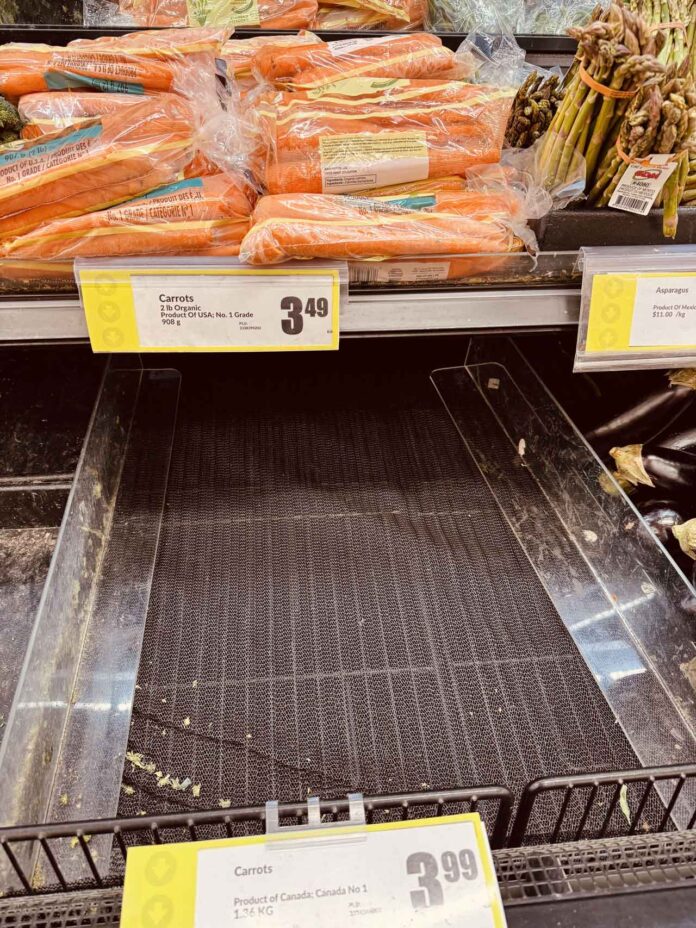Canadians are boycotting U.S. goods in response to Trump’s tariff threats, boosting Canadian businesses and products
THUNDER BAY – OPINION – Shopping has changed! Today a trip to a grocery store is to read labels, and make sure that you are supporting Canadian companies and boycotting American products.
Why?
Simply put it is due to the threats from Donald Trump.
Without prompting Canadians are taking the economic sanctions threatened by U.S. President Trump as a threat to our country’s right to exist.
Trump, seemingly famous for putting his mouth in motion before engaging his brain has in mere weeks taken the longest undefended border in the world and seen Canadians putting up a snow fort of economic power into action.
The other day pushing a shopping cart at a local grocery store the impact of the new Canadian determination was easily seen in the produce aisle. All the Canadian grown carrots were gone, and it appeared no one was buying the cheaper American ones.
The economic sanctions proposed by President Trump have created ripples across various sectors in Canada. The imposition of tariffs could lead to increased costs for imported goods, affecting both businesses and consumers. Canadian companies that rely heavily on exporting to the U.S. would face significant challenges, potentially leading to decreased revenues and job losses.
The agricultural sector, in particular, could suffer as tariffs on Canadian dairy, meat, and produce could make these products less competitive in the U.S. market.
This would force Canadian farmers and producers to find alternative markets, which might not be as lucrative or readily available.
In response to the potential economic strain, Canadians have become more vigilant in supporting domestic products. This shift is not just a reactionary measure but a strategic one, aiming to reduce dependency on U.S. imports and strengthen the local economy.
By prioritizing Canadian-made goods, consumers are indirectly boosting local industries, fostering innovation, and ensuring job security within the country.
An online social media page has grown in a grassroots manner to almost a million followers in mere days.
Canadians are taking the boycott America process seriously. It is seeing Canadian snowbirds head to other warm spots for their winter vacations.
It is hitting hard at Nashville Tennessee where country music fans are cancelling holiday plans. Canadians are the number one
The impact of these tariffs extends beyond the economic realm. They also affect diplomatic relations between the two nations, potentially leading to a strained partnership that could have long-term implications. As Canada navigates these challenges, the emphasis on self-sufficiency and community support grows stronger, underscoring the resilience and adaptability of its people.
For many of us, it means changing brands from the usual family favourites to Canadian made. Shifting from Campbell’s soup to Alymers soup is just one example.
This shift to Canadian products extends beyond just soups. It includes opting for Canadian dairy products, such as choosing Dairyland over other brands.
Many have also embraced Canadian snack options like Old Dutch chips instead of imported alternatives.
Supporting local farmers by purchasing produce grown within Canada has become a priority, ensuring fresher and often more sustainably sourced options.
Buying local not only boosts the economy but also reduces the carbon footprint associated with transporting goods over long distances. It fosters a community spirit, knowing that every purchase supports local jobs and businesses.
As more consumers make mindful choices, the demand for Canadian goods continues to rise, encouraging even more variety and innovation within our markets.
Next time you stroll through the aisles, take pride in the choices that reflect your values and support our homegrown industries.
Shopping Canadian isn’t just a trend; it’s a meaningful move towards building a robust and self-sufficient economy.
Canadians, known the world over as polite, are looking at the United States, our long-time friend, as an economic enemy due to Trump’s threats. The threatened imposition of tariffs by the United States has catalyzed a shift in consumer behavior and preferences across Canada.
This newfound economic nationalism is reflected in the growing support for domestic products and the prioritization of local businesses over foreign imports.







